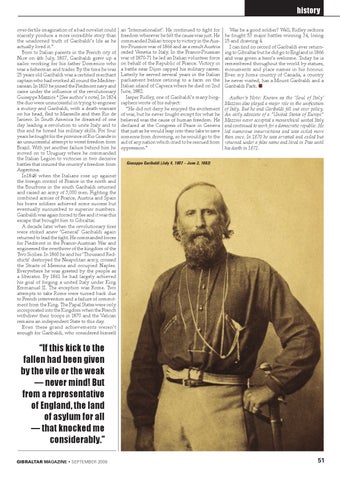history over-fertile imagination of a bad novelist could scarcely produce a more incredible story than the unadorned truth of Garibaldi’s life as he actually lived it.” Born to Italian parents in the French city of Nice on 4th July, 1807, Garibaldi grew up a sailor working for his father Domenico who was a fisherman and trader. By the time he was 25 years old Garibaldi was a certified merchant captain who had worked all round the Mediterranean. In 1833 he joined the Piedmont navy and came under the influence of the revolutionary Guiseppe Mazzini * [See author’s note]. In 1834 the duo were unsuccessful in trying to engineer a mutiny and Garibaldi, with a death warrant on his head, fled to Marseille and then Rio de Janiero. In South America he dreamed of one day leading a revolution to unite Italy and to this end he honed his military skills. For four years he fought for the province of Rio Grande in an unsuccessful attempt to wrest freedom from Brazil. With yet another failure behind him he moved on to Uruguay where he commanded the Italian Legion to victories in two decisive battles that insured the country’s freedom from Argentina. In1848 when the Italians rose up against the foreign control of France in the north and the Bourbons in the south Garibaldi returned and raised an army of 3,000 men. Fighting the combined armies of France, Austria and Spain his brave soldiers achieved some success but eventually succumbed to superior numbers. Garibaldi was again forced to flee and it was this escape that brought him to Gibraltar. A decade later when the revolutionary fires were stoked anew ‘General’ Garibaldi again returned to lead the fight. He commanded forces for Piedmont in the Franco-Austrian War and engineered the overthrow of the kingdom of the Two Sicilies. In 1860 he and his ‘Thousand Redshirts’ destroyed the Neapolitan army, crossed the Straits of Messina and occupied Naples. Everywhere he was greeted by the people as a liberator. By 1861 he had largely achieved his goal of forging a united Italy under King Emmanuel II. The exception was Rome. Two attempts to take Rome were turned back due to French intervention and a failure of commitment from the King. The Papal States were only incorporated into the Kingdom when the French withdrew their troops in 1870 and the Vatican remains an independent State to this day. Even these grand achievements weren’t enough for Garibaldi, who considered himself
an ‘Internationalist’. He continued to fight for freedom wherever he felt the cause was just. He commanded Italian troops to victory in the Austro-Prussion war of 1866 and as a result Austria ceded Venetia to Italy. In the Franco-Prussian war of 1870-71 he led an Italian volunteer force on behalf of the Republic of France. Victory in a battle near Dijon capped his military career. Latterly he served several years in the Italian parliament before retiring to a farm on the Italian island of Caprera where he died on 2nd June, 1882. Jasper Ridley, one of Garibaldi’s many biographers wrote of his subject: “He did not deny he enjoyed the excitement of war, but he never fought except for what he believed was the cause of human freedom. He declared at the Congress of Peace in Geneva that just as he would leap into their lake to save someone from drowning, so he would go to the aid of any nation which cried to be rescued from oppression.”
Was he a good soldier? Well, Ridley reckons he fought 53 major battles winning 34, losing 15 and drawing 4. I can find no record of Garibaldi ever returning to Gibraltar but he did go to England in 1866 and was given a hero’s welcome. Today he is remembered throughout the world by statues, monuments and place names in his honour. Even my home country of Canada, a country he never visited, has a Mount Garibaldi and a Garibaldi Park. n Author’s Note: Known as the ‘Soul of Italy’ Mazzini also played a major role in the unification of Italy. But he and Garibaldi fell out over policy. An early advocate of a “United States of Europe” Mazzini never accepted a monarchical united Italy and continued to work for a democratic republic. He led numerous insurrections and was exiled more than once. In 1870 he was arrested and exiled but returned under a false name and lived in Pisa until his death in 1872.
Giuseppe Garibaldi (July 4, 1807 – June 2, 1882)
“If this kick to the fallen had been given by the vile or the weak — never mind! But from a representative of England, the land of asylum for all — that knocked me considerably.” GIBRALTAR MAGAZINE • SEPTEMBER 2009
51
